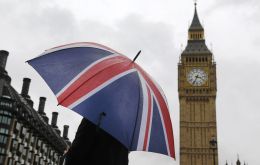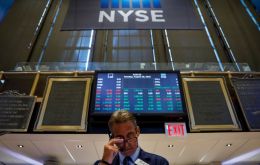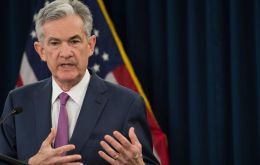MercoPress. South Atlantic News Agency
Tag: economic growth
-
Wednesday, January 9th 2019 - 08:40 UTC
World Bank says global economy is “soft landing”, so far “orderly”

The World Bank is warning of increasing risks, or what it calls “darkening skies”, for the world economy. In its annual assessment of global prospects the Bank predicts continued, though somewhat slower, growth this year and next.
-
Tuesday, December 18th 2018 - 09:03 UTC
UK economy growth feeling the uncertainty impact of Brexit: weakest since 2009

British economic growth this year and in 2019 looks set to be the weakest since the country’s last recession, due to a freeze in business investment and weak consumer demand ahead of Brexit, the British Chambers of Commerce forecast on Tuesday.
-
Thursday, August 30th 2018 - 09:10 UTC
U.S. economy in the second quarter expanded at an annualized 4.2%

The United States economic growth was stronger than initially thought in the second quarter, notching its best performance in nearly four years and putting the economy on track to hit the Trump administration’s goal of 3% annual growth.
-
Thursday, August 23rd 2018 - 08:48 UTC
Chile's GDP in the second quarter grew 5.3%

Chile's gross domestic product grew 5.3% in the second-quarter of 2018 compared with a year earlier, its biggest jump in nearly six years, the central bank said this week.
-
Tuesday, July 17th 2018 - 09:30 UTC
Brazilian market lowers 2018 economic growth to 1.5%, reveals central bank survey

Brazil's financial institutions on Monday reduced the 2018 economic growth forecast to 1.5%, half the initial estimate issued at the beginning of the year, according to the Central Bank weekly survey. The Focus Bulletin, which interviews analysts and economists from Brazil's financial market every Monday, the country's growth estimate was actually reduced from the previous week's 1.53%.
-
Tuesday, July 17th 2018 - 09:24 UTC
China's growth declines in second quarter; expanding government debt trims Beijing's credit rating

China's economic growth slowed in the quarter ending in June, adding to challenges for Beijing amid a mounting tariff battle with Washington. The world's second-largest economy expanded by 6.7%, down from the previous quarter's 6.8%, the government reported Monday.
-
Thursday, June 14th 2018 - 08:13 UTC
Fed raises basic rate to 2%; anticipates further increases amid strong economic growth

The US Federal Reserve raised the benchmark lending rate on Wednesday, the second increase of the year, and signaled it will be more aggressive about rate increases this year and next amid “strong” economic growth. The unanimous vote brings the federal funds rate to a range of 1.75 to 2%, but the quarterly economic forecasts show central bankers now expect the rate to end the year at 2.4% rather than the 2.1% projected in March.
